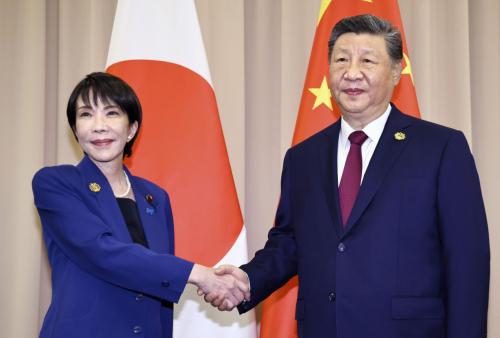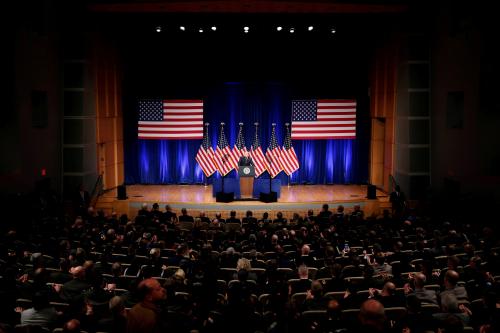The liberal order—the system designed to ensure international security that has as its pillars the United Nations, multilateral security treaties, NATO, and European integration—is strongly dependent on Western and in particular U.S. power. With new, non-Western powers rising or resurgent, and the West (especially Europe) in apparent decline, it is natural to ask whether the liberal order is destined to fade away.
Over the last few years, Russia and China have joined forces to keep the United States out of Central Asia, and have made some inroads into other regions, such as the Middle East and Africa, where U.S. or Western power is not as established as it is in Europe and the Asia-Pacific. Regional tensions have often reverberated on a global level, hampering the ability of the United Nations Security Council (UNSC) to meet its responsibilities for promoting peace and security.
In light of this, multipolarity has been sometimes compared to an incurable disease that will eventually kill the liberal order. But there is insufficient evidence to take this as a foregone conclusion. Two factors should urge caution.
First, in spite of the severe deterioration in Western-Russian relations following the Ukraine crisis, international security is still characterized more by functional threats such as jihadism, nuclear proliferation, and regional crises, than it is by great power conflict.
Functional threats are evidently insufficient to create a permanent bond of friendship between otherwise competing countries. Yet, such threats engender a powerful logic of pragmatic cooperation even among such countries. The case of Iran’s nuclear program, on which the West and China and Russia have successfully cooperated in the P5+1 framework, is a good case in point.
The institutions of the liberal order might always not be the venue where the international responses to these threats are discussed and decided upon—in fact, selective forms of cooperation seem to warrant ad hoc mechanisms of cooperation, such as contact groups. Yet, these institutions—most notably the UNSC but also a number of international treaties and regimes, for instance in the non-proliferation field—still provide a common normative and discursive framework from which great powers cooperation draws legitimacy and, eventually, authority.
The second factor concerns the structural limits of the multipolar challenge to the liberal order. Russia and China are both interested in maximizing their influence in their neighborhoods and, since U.S. power is the main factor inhibiting their ambitions, they strive to see it reined in. Yet, China and Russia also benefit from the effects of the U.S. action as guarantor of international security. In addition, they have not yet presented alternatives to the U.S.-based liberal order. China might one day reach such levels of development and resource accumulation that Beijing might eventually cast the die and make its bid for world domination. But evidence of this possible trajectory is so far lacking. Neither China nor Russia possess the economic and military strength of the United States. More critically, they both lack its large system of alliances and partnerships. Neither is able, nor willing, to make a bid to replace the United States as the ultimate guarantor of world security.
The picture, then, is mixed. Multipolarity may indeed be seen as a disease of the liberal order, but not necessarily an incurable one. It is more akin to a chronic illness that can be kept under control if treated with the proper mix of medications.
In strategic terms, this contrasting picture presents the United States with a binary choice. It can either determine that China and Russia present unacceptable challenges to its power and the liberal order that rests on it, thereby prioritizing containment of their influence. Or it can make avoiding great power conflict a strategic imperative. Either way, the United States will make use of its many foreign policy assets, including its long-standing bond with the Europeans. Europe’s contribution, however, would depend on which of these courses the United States takes.
In the first scenario, the Europeans are unable to make full use of the EU economic and normative power to promote security. At a regional level, the EU remains a component of European security governance, but in an ancillary position vis-à-vis a NATO recalibrated as an anti-Russia alliance. NATO enables the U.S. policy of containment of Russia, but at higher political and financial costs, as Washington faces a plurality of European countries that do not perceive Russia as a direct threat and remain unwilling to invest heavily in defense. On the Asian-Pacific chessboard, Europe’s contribution to security governance is non-existent. In fact, if the U.S. pivot to Asia evolves into a policy of containing China, the Europeans may turn out to be a liability, as EU commercial interests in China can run counter to Washington’s goal of weakening Beijing.
In the second scenario, the United States predicates its foreign policy on the imperative to avoid great power conflict. The idea of global security governance prevails, defined by a constant balancing act between containing tensions and increasing selective cooperation between great powers. Because multipolar relations are not adversarial, the EU can use its collective economic power with greater leeway, either as an instrument to coerce with sanctions or as an instrument of persuasion via rewards. In Europe, the EU’s role is complementary rather than ancillary to NATO, with the latter focused on deterrence and defense (rather than containment) and the former freer to modulate between pressure and engagement. So long as confrontation with Russia is carried out outside a full containment policy, diverging European views on the matter are easier to handle. In the Asia-Pacific, Europe’s role remains marginal, but EU-China diplomatic exchanges and trade are less threatening to U.S. policies.
Multipolarity may have injected a degree of unpredictability into the international system, but there is no reason to assume that it will lead to the liberal order’s collapse. Much will depend on how the United States decides to adjust. Whether it opts for containment and confrontation or pragmatic engagement of non-Western powers, Europe will follow. Its contribution, however, will be more modest in the former than in the latter case. Multipolarity may indeed be a disease of the liberal order. But if that order eventually dies, the cure, not the disease, will carry the blame.
The Brookings Institution is committed to quality, independence, and impact.
We are supported by a diverse array of funders. In line with our values and policies, each Brookings publication represents the sole views of its author(s).




Commentary
The West, multipolarity, and the liberal order
April 10, 2015